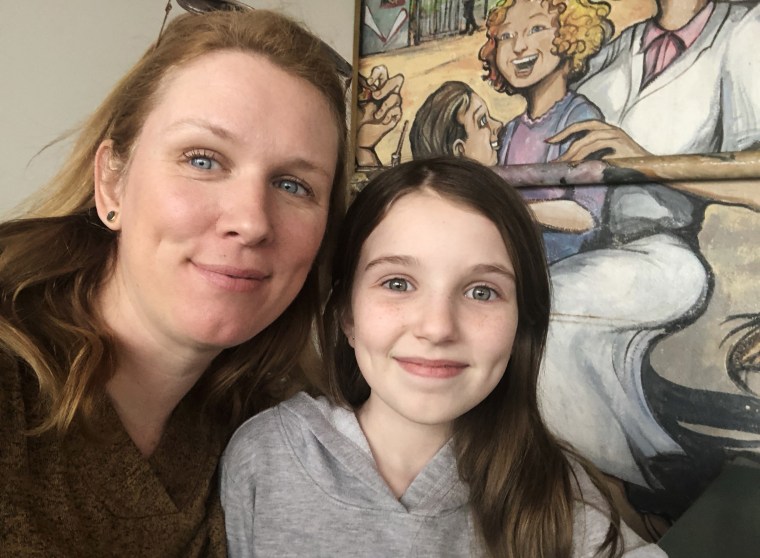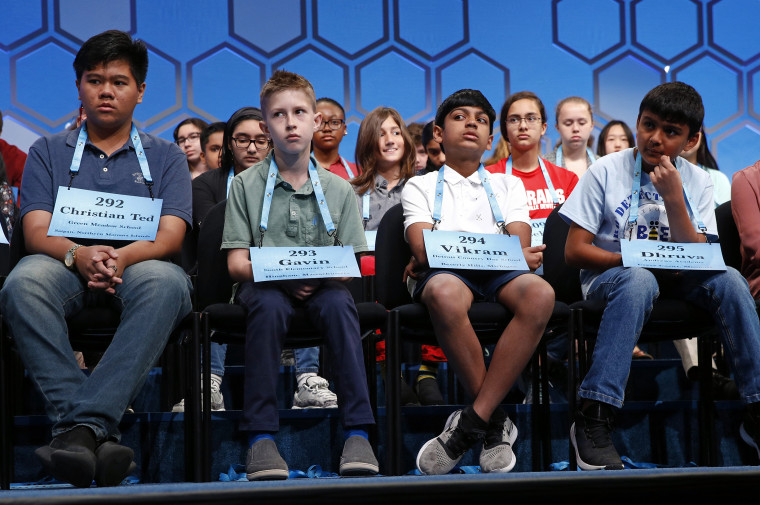My 10-year-old daughter Clara shifted nervously as she sat on stage waiting her turn in her elementary school’s spelling bee this January. Most of the fourth- and fifth-grade competitors surrounding her in the combination gym/cafeteria/auditorium sat rigidly, their faces set in grim concentration. But that was nothing compared to the tension in the audience: We parents squirmed in our seats, sighing and gasping and holding our breaths as our kids slowly spelled their words.
In the weeks leading up to the contest, Clara had come home with study lists and strategies for success. Her dad and I did our best to prepare her, but it wasn’t easy for our daughter to stay focused. A dreamy child, Clara spends her after-school hours sketching and painting, writing stories and talking to friends. She loves words, as anyone who has held a conversation with her knows. But memorization is not the same as communication, and spelling word after word (that she’d rather be inserting in a juicy story) didn’t exactly light her up.
I still remember excruciatingly well the moment I was ousted from my own fourth-grade spelling bee.
When the big event came, Clara wasn’t the first competitor eliminated, but it didn’t take long for her to face defeat. “Glands” was her downfall. She heard “glance” and that’s what she spelled: right letters, wrong word. After she left the stage, I found her standing in the hall with her eyes reddened, composing herself and trying not to cry. “In an hour, you’ll have forgotten all about this,” I said to comfort her.
But that was a lie. I still remember excruciatingly well the moment I was ousted from my own fourth-grade spelling bee. Thirty-two years earlier, I’d snagged one of the top two spots in my school to advance to the district bee. There I was defeated by the word “trapeze,” one I’d seen dozens of times and really knew how to spell, I swear. As it turns out, in a high-stakes, high-stress situation like a spelling bee, “knowing” doesn’t always save you.
And I’m hardly alone. Just ask any room full of adults if they remember their school spelling bee, and I bet you that most, if not all, can recall not just the experience, but also the very word that brought them down. The comments on my Instagram post about Clara’s spelling bee loss illustrate this: 20, 30, 40 years later, we still remember the moment we learned that you can study really hard at something and still fail. That sometimes life is unfair. That it’s not always enough to be “naturally” good at something.

Yes, these are all important, character-developing things to learn. But as I walked away from Clara’s spelling bee, feeling just as rotten for the kids who won as for the kids who lost (the winners would be advancing to the district level, so they were going to have to do it all over again!), I reflected on the fact that I held a device in my hand, a “smartphone,” that would literally not allow me to misspell a word. Memorization may be a useful skill, but in the world in which our kids are growing up, is a competition that puts rote memorization above all else relevant enough to our daily lives to make the spectacle worthwhile?
Now, before you jump to conclusions, believe me: I’m not just sore because my kid didn’t win the spelling bee. I’m not one of those “special snowflake” moms who can’t stand the thought of my child failing. I don’t like participation trophies and I have no problem with competitive activities. In general, I’m a big fan of hard lessons and I tend to take an old-school approach to self-discipline.
But I also know that these days, success is determined not by the data stored in your personal memory bank but by how nimble you can be in accessing the endlessly available information stored elsewhere. And to me, the spelling bee stands out as a particularly outdated ritual that embodies the disconnect between the way kids are still expected to learn and the world they’ll navigate once school is over.
Let’s face it: We adults love our kids to have the same experiences as the ones we grew up with, so we’re often not very good at questioning why we still do something, decade after decade after decade. While there may be a place for that throwback, the spelling bee, I question its usefulness as a regular, celebrated, schoolwide event at the elementary-school level.
Spelling bees, it’s argued, do little to promote literacy in a useful way. I can only imagine that they’re sheer torture for kids with learning disabilities. It’s true that at an elite level, spelling is about more than memorization— to be a great speller, you need to learn about the origins of words and how they are used — but let’s be honest here: Is your average fourth-grader really excited about etymology?
Speaking of elite spellers, this week, more than 500 children ranging from 8- to 15-years-old will compete in Maryland for a $50,000 prize in the Scripps National Spelling Bee. The event will be televised on ESPN, and if I happen to be near a television when it’s on, I’ll probably watch it (as well as I can see it, that is, while peeking nervously from behind my fingers). Similar to watching the Olympics, observing really freaky-smart kids spell words I’ve never even heard of can’t help but keep me entertained.
But while the savant-level competitors who can make it to the national stage are impressive, to say the least, I can’t say I’d encourage any of my kids to take on that level of stress — especially considering all the free time they’d be giving up to make it. Of course, none of my kids have the kind of focus, drive, attention span and spelling talent to compete at that level, either. More than likely, neither do yours.
For me, what it really boils down to is this: We just can’t do it all. In a typical day, more is expected of Clara than it was of me 32 years ago. She has more to learn and more to do, both during and after school. Teachers, as well, are more strapped than ever before, sometimes barely able to fit all the required standards into their day. There’s less time and less money for lots of important things: creativity, the arts, reading for pleasure, play — or simply doing nothing, something today’s kids rarely get to experience.
There’s less time and less money for lots of important things: creativity, the arts, reading for pleasure, play — or simply doing nothing.
So when we encourage kids to spend hours practicing for an event in place of creating, doing homework, dreaming, playing or just hanging out with their families —then disrupt the school day for an hour or two to fill a gym with kids either being spectators or participating in a particular competition — we’re sending a pretty clear message to all involved: This is important.
I’m just asking. Is it, really?
Next year, Clara will face the option of doing the spelling bee again. She’s a people-pleaser and I can see her downplaying the stress and disappointment she went through this year in hopes of making her teachers, parents and classmates proud. Of course, I won’t discourage her if she wants to compete, but I want to make sure that’s really what she wants to do, given all the sacrifice that goes along with it.
Personally, I think she’s got better things to do, and I have a feeling she’ll agree.

